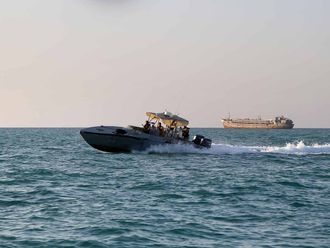Tehran: New US sanctions could push Tehran to rethink its cooperation with the United Nations atomic watchdog, Iran's former chief nuclear negotiator said on Friday.
Ali Larijani was speaking a day after Washington branded Iran's Revolutionary Guards a proliferator of weapons of mass destruction and imposed new sanctions on the country, which it accuses of trying to develop atomic weapons.
Iran denies the charge and has agreed to clear up long-standing suspicions about its nuclear goals with the UN International Atomic Energy Agency. But it has refused to halt sensitive atomic work as demanded by the UN Security Council.
"Other countries support and praise us regarding Iran's cooperation with the agency," Larijani said in comments carried by Iran's ISNA news agency after his return from talks with European Union foreign policy chief Javier Solana in Rome.
"But America's behaviour shows that it doesn't make any difference whether Iran cooperates with the agency or not. Well, if that is the case, you should expect something else from Iran," he said, adding that European states had urged Iran not to respond to the "bullying behaviour of [some] countries".
Isolating themselves
Larijani was replaced as chief nuclear negotiator on Saturday but remains on the Supreme National Security Council, which helps make policy. He attended the Rome talks in that capacity with the new chief negotiator, Saeed Jalili.
"With this behaviour, the Americans are only isolating themselves," Jalili said of the sanctions, according to the official Irna news agency. China said yesterday that new sanctions imposed by the United States on Iran will only make tackling the Tehran nuclear issue more difficult, state media said yesterday.
"When the international community and Iran are devoted to resolving the Iranian nuclear issue through dialogue, it can only make the issue more complicated to impose new sanctions on Iran," foreign ministry spokesman Liu Jianchao was reported as saying by the official Xinhua news agency.
The sanctions announced on Thursday target the Islamic Revolutionary Guard Corps, accused of spreading weapons of mass destruction, and the IRGC's elite Quds Force, which was designated as a supporter of terrorism.
Three Iranian state-owned banks were also blacklisted, along with IRGC-controlled companies and the logistics arm of Iran's defence ministry.
In Washington US Secretary of State Condoleezza Rice defended expanded US sanctions and downplayed any rift with Russia over the policy. "The international community cannot just sit idly by until we face unpalatable choices. A nuclear weapon in the hands of the Iranian regime would be deeply destabilising in the world's most volatile region," she said on NBC's Today show.
'Mad man'
The United States on Thursday slapped new sanctions on Iran and accused its Revolutionary Guard of spreading weapons of mass destruction. Russian President Vladimir Putin criticised the move, saying it would force Tehran into a corner over its nuclear programme.
"Running around like a mad man with a blade in one's hand is not the best way to solve such problems," he said. The White House also played down disagreements with Russia on Iran and dismissed concerns raised by critics that the administration's escalating rhetoric against Tehran mirrored the run up to the Iraq war.












